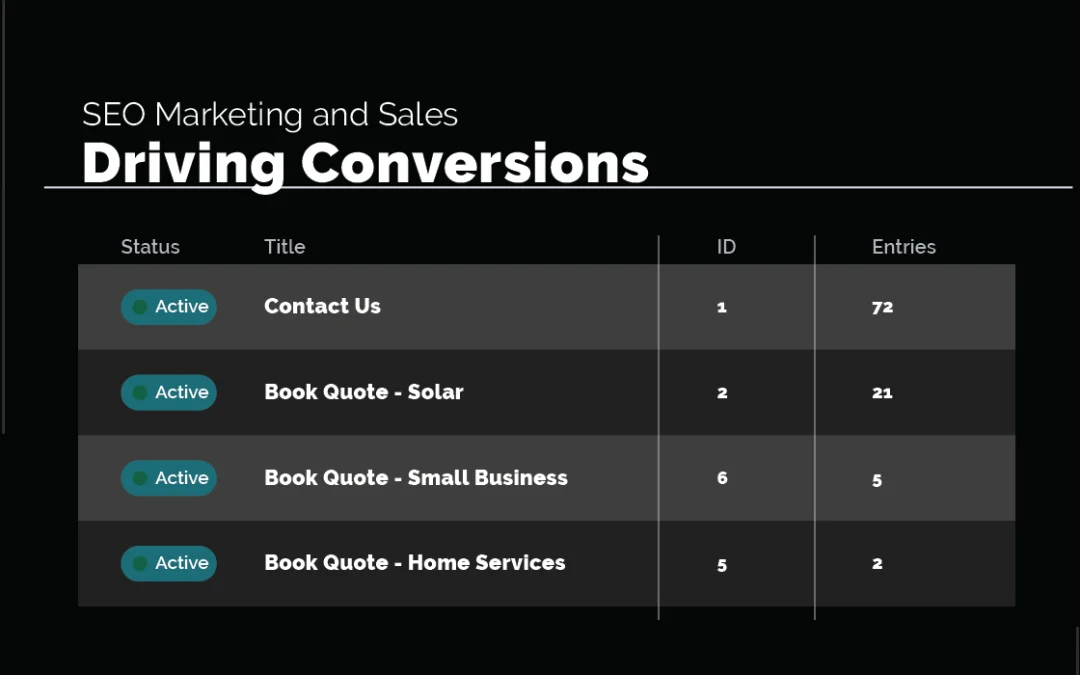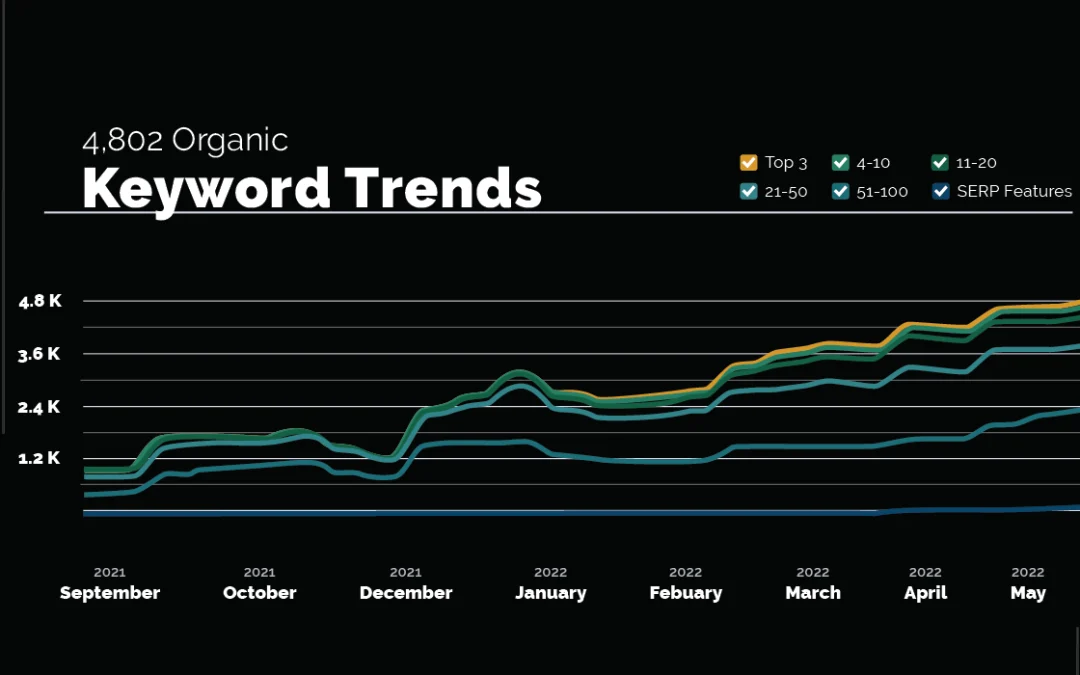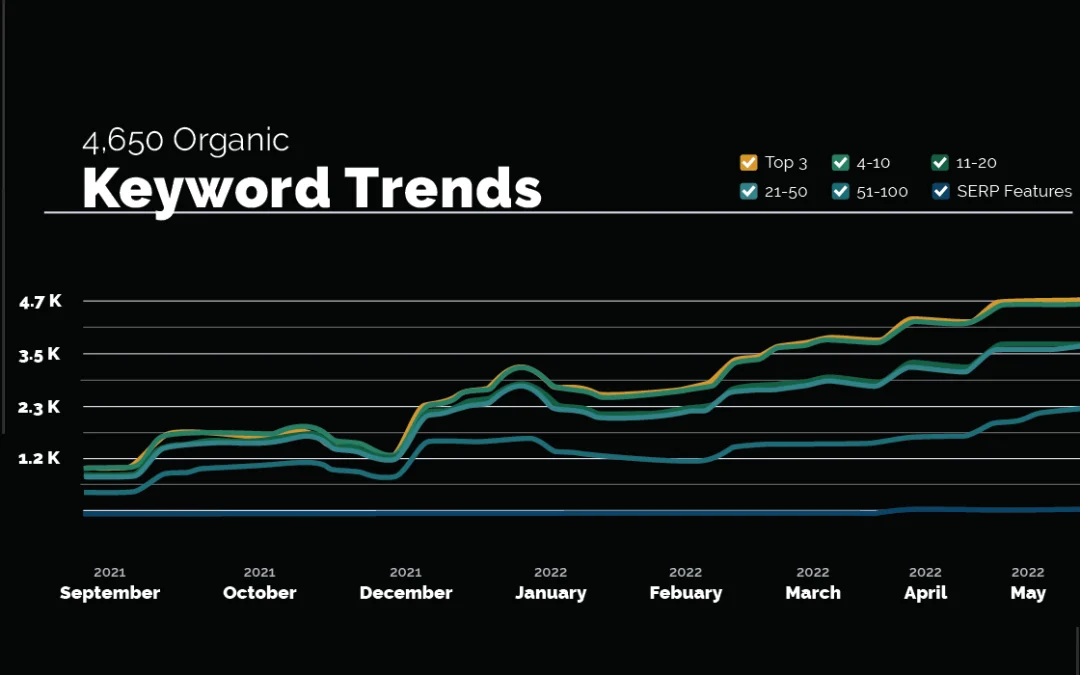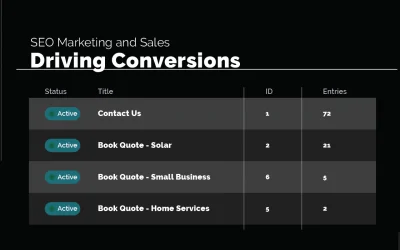Summary
- AI tools like ChatGPT and SORA speed up content creation, but human intuition is still crucial.
- Audience trust is harder to earn with AI-generated content, making human creativity more important.
- Personal stories build strong connections with audiences, setting human-made content apart from AI.
- Real-world experience, like that of CPAs, adds valuable context AI can’t fully grasp, ensuring well-rounded content creation.
We have to talk about AI.
It doesn’t matter how you feel about it—artificial intelligence is everywhere. ChatGPT has been making waves for over a year now. Ditto for Midjourney. OpenAI, the company behind ChatGPT and DALL-E, recently unveiled SORA, which generates video content up to a minute long based on nothing but user prompts.
Applications for this technology will only become more widespread—and more eyebrow-raising—as humanity explores this new frontier together. If that’s not enough to make you rethink the role of digital content for your business, you aren’t paying enough attention.
But I’m not writing this article with help from AI, and there’s a good reason. Although there are valid uses for AI that businesses must embrace to stay competitive in 2024, the way in which it’s changing practically every industry under the sun actually highlights the need for human involvement—specifically, the experiences and intuition that machines cannot (yet) mimic.
We have to stop looking at personal narratives and human experiences as the inspiration for content, and start seeing them as essential elements of the content itself. From there, making successful content becomes about presenting those narratives and experiences in ways that are compelling and consumptive for users. And if you keep reading, I’m going to show you how.

Lesson 1: AI Makes Earning Trust Harder
Earning trust is harder now because of spam content. For proof, look at your own life—most of us don’t even answer phone calls or emails anymore because of spam. But the same principle now applies to digital content as well.
Now anyone, anywhere, can produce any volume of content they want, anytime. As a result, the internet is getting flooded with low-level content that makes finding actual solutions to problems more difficult and frustrating for users.
See Also: 4 Creative Ways to Use AI for Content Marketing
Content Creation Isn’t Dead—It’s Just More Difficult
Creatives worry that this will kill their careers, but they shouldn’t (at least, no more so than anyone else). That’s for two reasons:
- One: The frustration that lowest-common-denominator content creates for users represents an opportunity for creators. Content that manages to cut through the noise is now even more impactful.
- Two: Imitating the mechanics of creativity is not the same as being creative. The Oxford dictionary definition of art is “the expression or definition of human creative skill and imagination”. Creativity is defined as “the use of the imagination or original ideas, especially in the production of artistic work.” These are things machines cannot do. They don’t create; they merely aggregate and replicate.
The problem is that for some forms of content, replicating is enough to get the job done. This means content has to work harder to stand out from the pack and distinguish itself as something valuable. To understand that, we need to look at how different content elements are perceived by audiences.
Lesson 2: Learn How People Perceive Content
There’s actually a very easy way to gauge how successful a piece of content will be at earning trust from users. Basically, the more assets a piece of content has—and the more diverse they are—the more trust it gets.
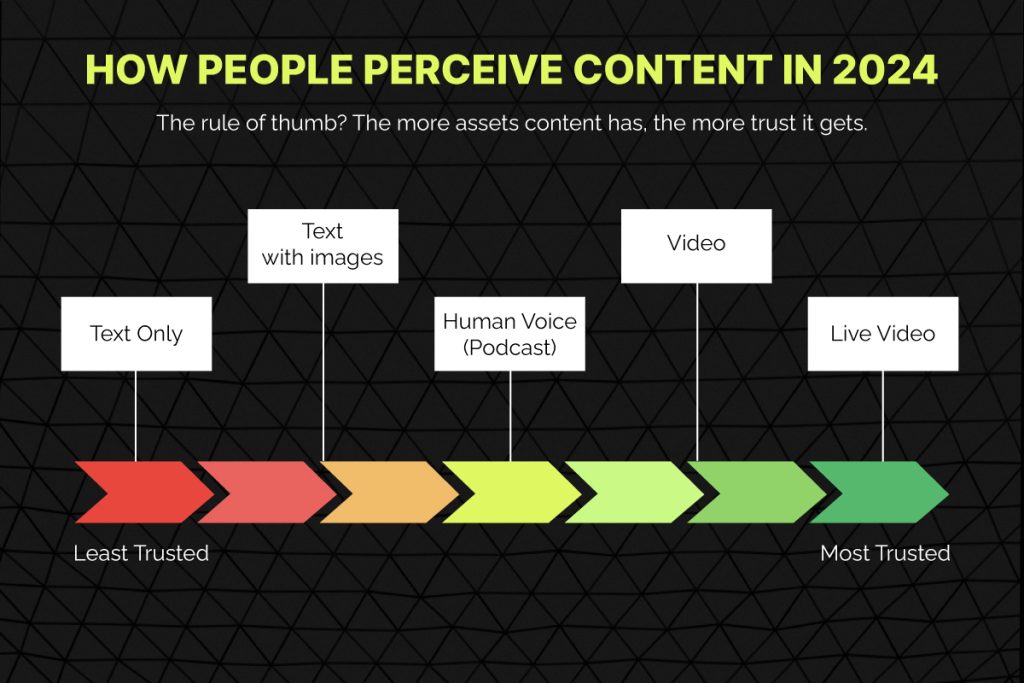
But there’s another important criterion here. If you look at the examples above, you’ll see the assets that earn the most trust are also the ones most difficult (or outright impossible) to replicate with AI.
A human voice on a podcast inherently connects more with people than an artificial one. A video showing a person doing something that an AI obviously can’t do is more credible than a video that was clearly AI generated. But because it’s so easy to produce simple text and images with these tools, they’re effectively devalued unless they’re saying or showing something novel and unique.
AI Means More Work (Not Less) for Content Creators
All of this means earning audience acclaim now requires more effort. It doesn’t mean you can’t use older assets, but it does mean you have to work harder. It also means that if you’re using AI to produce these assets, you have to add something to what it puts out that elevates the results above and beyond what you would normally end up with.
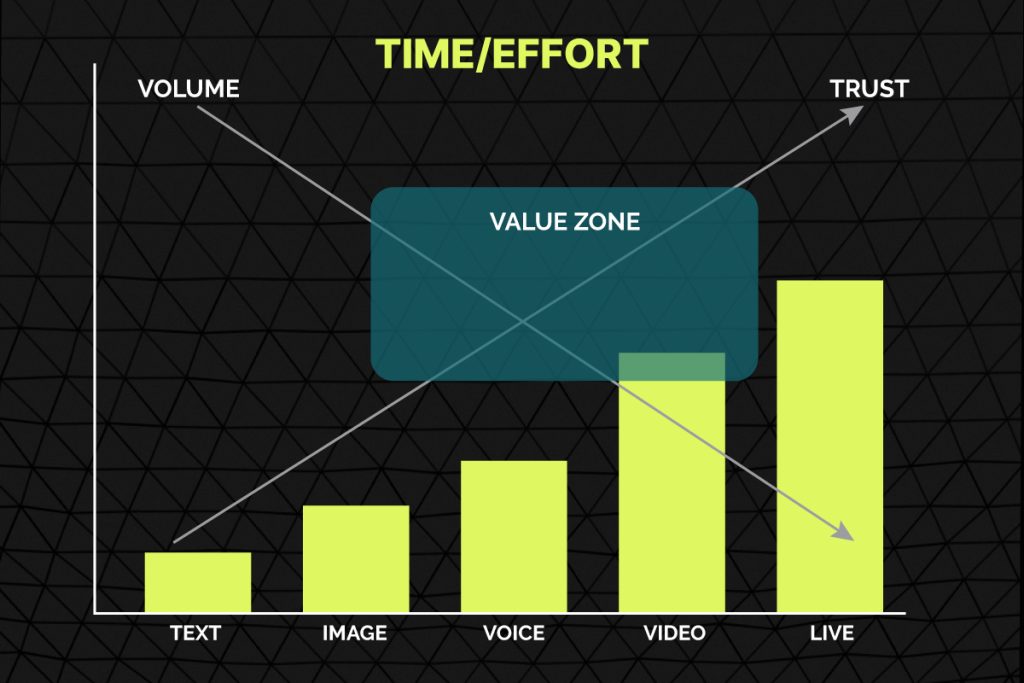
Blogs are still a viable way to build trust, but they’re not enough on their own anymore. Now you need to tie them into a broader content strategy. If your business has an established legacy (i.e. a few years or more of operating), you have a layer of insulation here. But what do new businesses need to do?
See Also: Content Marketing Solutions for Small Businesses: Overcoming Common Challenges
Lesson 3: Showcase the Personality Behind the Work
Bringing personal nuance to your content is now the biggest differentiator between content people will trust and content people will write off. How that’s presented depends on what you’re trying to achieve, but the point is, it needs to sound like it came from you—not like it was manufactured for your audience. This isn’t about tone and voice; it’s about experience that AI can’t replicate.
Content earns trust when it connects with audiences. When we talk about moving people through sales funnels, the key words there are moving people. You can’t do that with platitudes and hyperbole; you actually need to tap into a part of your human experience that resonates with theirs and causes them to empathize, because making a purchase is fundamentally an emotional decision. People don’t buy in unless it feels right.
See Also: 6 Creative Ways to Get More Google Business Profile Reviews (& Why It’s Important)

Real-Life Example: Getting Down to Brass Tax
Much has been made of using ChatGPT to provide legal, medical, or financial advice—but there’s a reason lawyers, doctors, and CPAs all still have jobs. That’s because all of these positions require a layer of intuition based on experience that allows the professionals involved to make recommendations based on an individual’s circumstances.
Take CPAs, for example. Accountants don’t just crunch numbers; they also recommend financial decisions based on business objectives and regulatory requirements written in language that’s frequently open to interpretation. The people who choose to work with these professionals do so because they trust that experience—this is their emotional buy-in.
Hold ‘Em or Fold ‘Em: The Tangible Value of Experience-Driven Insights
A business owner might use AI to process large amounts of quantitative data (like bank statements to identify trends in their expenses), but that doesn’t make it qualified to give tax advice.
Say your business is doing about $150,000 per year in sales. You’ve seen rapid growth in the past year, so you ask an AI for advice on how to manage the new risks that come with it and protect you from liability.
It’s very possible that an AI would tell you to establish a holding company to own your incorporated business. There are lots of valid reasons to do this, which I won’t list here because ChatGPT can do it faster (this is the one part of this article I did use AI for):
But while all of that is technically true, the AI is missing some important context here—for example, that you’ll have to pay about $2500 per year in corporate taxes for every company you own. So why would someone doing $150,000 in revenue take on the burden of an additional corporate tax return?
Being incorporated at this level makes sense, but having a holding company as well—when the corporation represents the entirety of its holdings—seems unnecessarily complex and expensive. This is the kind of thing that any experienced CPA would likely flag, but an AI wouldn’t consider unless it was explicitly prompted to do so (and if you knew enough to prompt it that way, you wouldn’t need the tax advice in the first place).
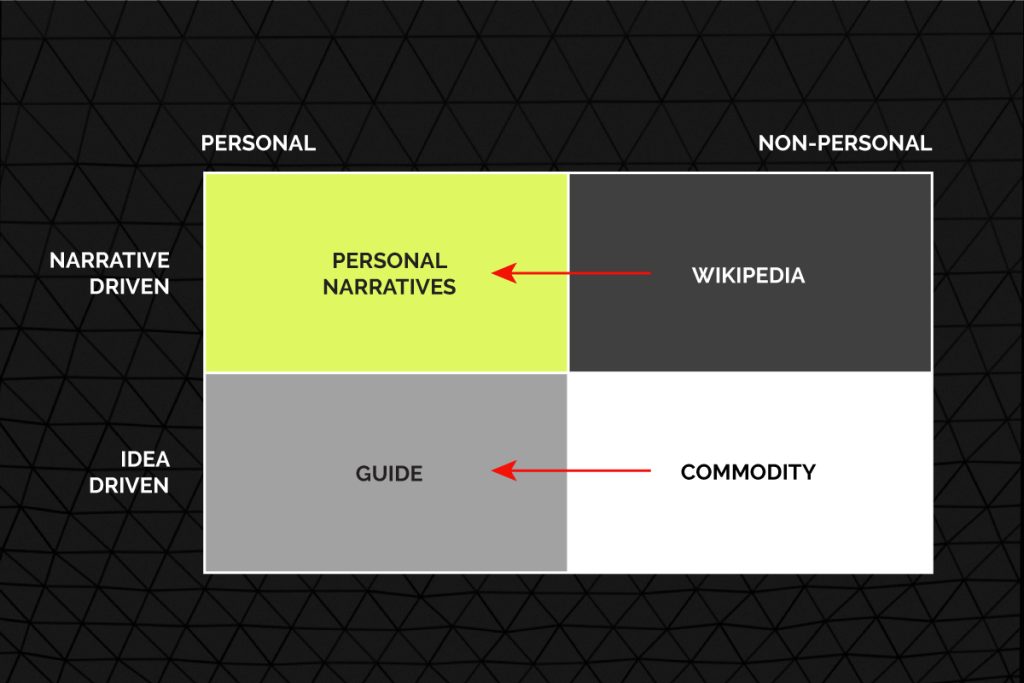
Straight From the Horse’s Mouth: We Asked an AI Expert
It’s easy to express opinions about AI; it’s harder to back them up—so I talked to my friend Dr. João Felipe Santos, who is a senior research scientist at NVIDIA. Here’s what he had to say:
[Disclaimer: the views expressed below are the private thoughts and feelings of Dr. Felipe Santos and do not represent any official position held by NVIDIA or its stakeholders.]
“There are certain things a computer can’t learn because these lessons don’t just come from aggregating data; they come from having agency in the world.
There is a field called Grounded Language Learning, which is about learning languages from experience—for example, what can you discover about language by learning it through a video game instead of reading the definitions of words? How do these experiences provide essential context?
This is a similar approach to how self-driving cars are trained—they learn in a simulation and then transfer that experience to the real world. But as we’ve seen, there are problems with this—because you can learn a lot of things in a simulated environment, but what about the nuances of the world you cannot simulate?”
So there you have it. The value of human experience isn’t some airy-fairy philosophical thing; it’s both real and what gives us an edge over AI content generators, at least for the time being.

Efficient Content Creation Requires Synthesis Between Humans & Technology
You can’t discount the speed at which AI allows us to create formerly time-consuming assets, but its limitations are as illustrative as its capabilities. For businesses and other content creators, the lesson is clear: the more of yourself and your experience you put into what you create, the more it will stand out from the flood of AI-generated material flooding the internet, and the more value it will have for your audience.
At Monochrome, we believe in embracing the capabilities that new technology offers—but although we accept AI as a drafting tool, our content is always planned and overseen by experienced creative professionals working closely with our partners to craft authentic messaging that resonates with audiences. Learn more about how content trends are changing by exploring our other articles—and connect with us for help planning and executing a strategy that highlights your unique experience and offerings.
Inspired by Nathan Baugh on X, who put to paper what I’ve been feeling for months.




